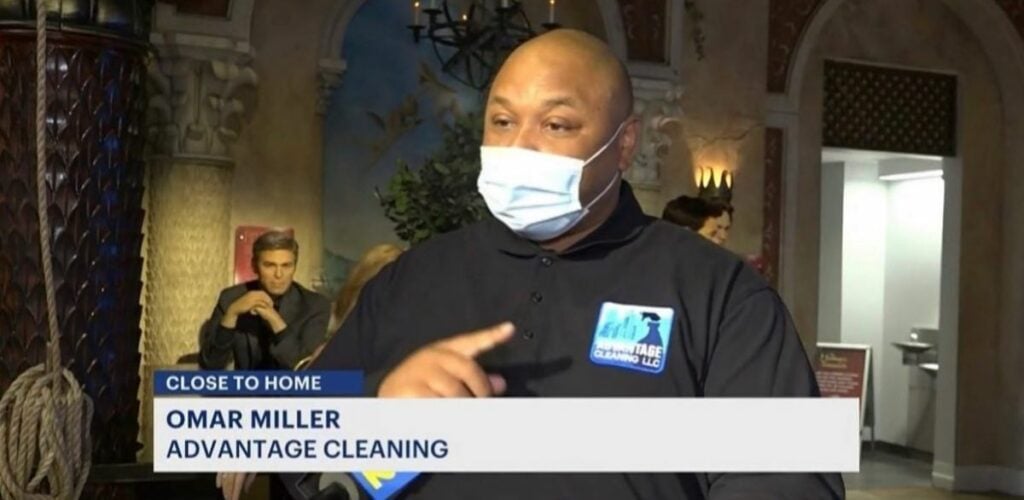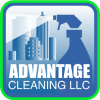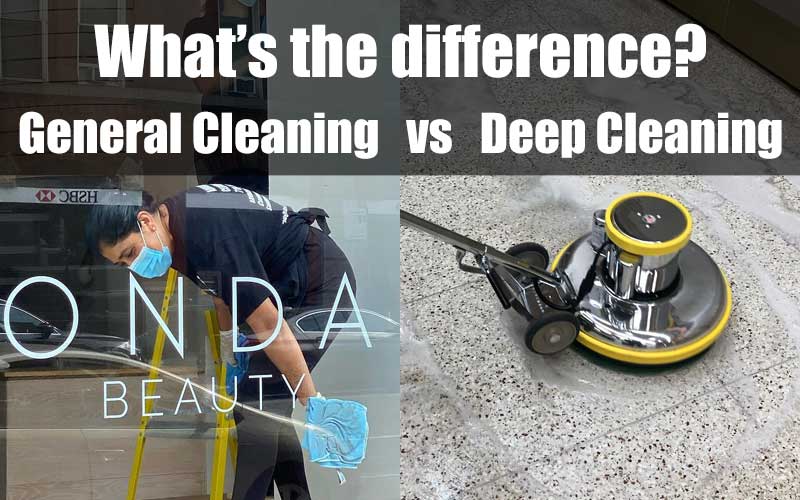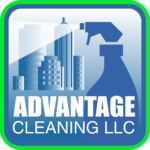There are many types of commercial cleaning but when cleaning a facility on a routine basis, there are two main types; general cleaning and deep cleaning. In this article we will explain the differences between general commercial cleaning vs commercial deep cleaning by covering their definitions, what they are used for, each cleaning process, how often each should be done, and the various tools and equipment.
What is Cleaning?
Cleaning Defined: To clean something means to remove all of the visible contaminations on the surface, including dirt, spills, food particles, dust, etc., by washing, brushing, or wiping the area. This process removes dirt on the surface level and does not kill germs but can help reduce their numbers. This is expected to be the first step in the cleansing process.
What is General Cleaning?
General cleaning focuses on areas that are easily visible, accessible and constantly being used or touched. These areas become dirty quickly due to their frequent use, are very noticeable because of their visibility and therefore cleaned often on a routine basis.
Areas being cleaned: frequently touched, daily use, common use areas.
Examples:
- Reception desks
- Lobby
- Waiting rooms
- Kitchen
- Bathrooms
- Meeting rooms
- Hallways
- Office desks
- Counters
- Door handles
- Light switches
- Phones
Ways of cleaning: removing loose items (i.e. trash), dusting, wiping down, cleaning with soap or detergent.
Frequency:
Daily/Weekly
What is Deep Cleaning?
Deep cleaning focuses on a more thorough cleaning process for all areas routinely cleaned and also includes the areas that are not typically covered during general cleaning.
Areas being cleaned: infrequently touched, uncommon use areas and general cleaning areas.
Examples:
- Inside of cabinets
- Major appliances
- Behind static objects (plants, curtains, furniture)
- Hidden corners
- Storage areas
- Closets
- Very high areas (ceilings, light fixtures)
- Very low areas (floors, baseboards)
- Carpet deep cleaning
- Floor stripping and waxing
Ways of cleaning: Shampooing, steaming, scraping/grinding, waxing, brushing.
Deep cleaning of hard surface floors and carpets such as floor stripping and waxing and carpet deep cleaning.

The Differences In General Cleaning vs Deep Cleaning
Cleaning Frequency
| General Cleaning Frequency | Deep Cleaning Frequency |
|---|---|
| Daily/Weekly | Monthly/Quarterly/Annually |
Cleaning Activities
General Cleaning Activities
- Empty trash (replace liner)
- Spot Clean Door Glass
- Clean and Sanitize Door Knobs and Push Plates
- Baseboards (Dust, Damp Wipe)
- Spot Clean Walls (No Flat Painted Walls)
- Clean and Sanitize Light Switches & Fixtures
- Medium Dust (sills, horizontal surfaces)
- Low Dust (baseboards)
- Vacuum carpet
- Vacuum corners and edges
- Vacuum floor mats
- Carpet spotting
- Replace burnt out light bulbs
- Scrub floor
- Floor cleaning (sweep/vacuum/damp mop)
- Window cleaning
- Restroom cleaning
Deep Cleaning Activities
- High Dust (Vents, Lights, Corners, Blinds, Items on Walls)
- Polish Floor
- Burnish Floor
- Clean and seal ceramic tile and grout
- Clean and Seal Stone Floor
- Machine scrubbing restroom floors (helps eliminate urine smell)
- Redoing of caulk around the toilets and sinks
- Wiping down all desks (ask employees to remove everything from the surface)
- Clean all kitchen cabinets, appliances, stove, oven, refrigerator, etc
- Dusting and wiping blinds
- Scrubbing baseboards
- Sweeping, vacuuming and mopping floors underneath furniture
- Clean and sanitize all computer keyboards and screen
- Window cleaning
- High dusting ceilings, fixtures, lighting
- Floor stripping and waxing
- Carpet deep cleaning
Necessary Cleaning Equipment for General Cleaning vs Deep Cleaning
General Cleaning Equipment
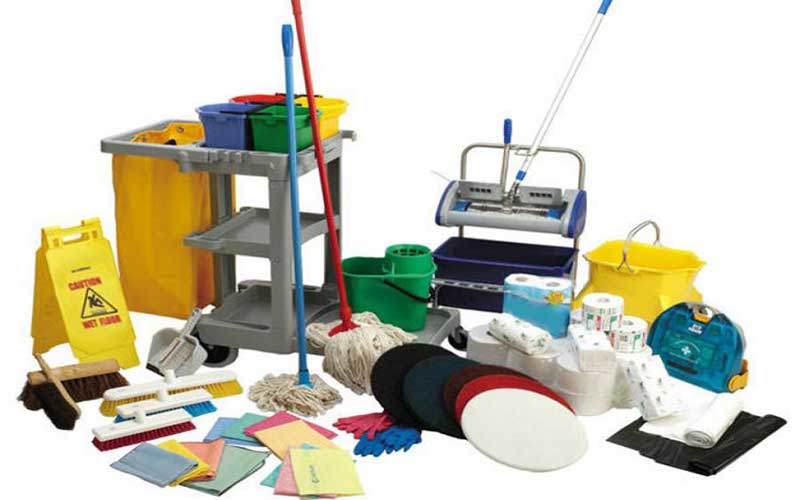
- Broom & dustpan
- Mop
- Vacuum cleaner
- Cleaning cart
- Buckets
- Gloves
- Shoe covers
- Spray bottles
- Towels/rags
- Toilet brush
- Toilet paper and paper towels
Deep Cleaning Equipment

- Electrostatic sprayer
- Floor machine (waxing and buffing)
- Carpet steamer
- Grout cleaning machine
- Pressure washer
- Water extractors
- Ladders
- Window cleaning equipment (squeegees and brushes)
- Extension poles
- Respirator
- Knee pads
You may notice that general cleaning requires equipment that is very familiar and commonly found in commercial facilities due to its frequency of use and necessity. On the contrast, deep cleaning equipment is often not easily accessible because it isn’t frequently used, many items are large, heavy-duty machinery and most of that machinery costs several thousands of dollars.
Necessary Cleaning Chemicals
General Cleaning Chemicals
- Bleach
- Multipurpose cleaner
- Wood polish
- Stainless steel polish
- Toilet cleaner
- Glass cleaner
- Floor cleaner
- Trash can liners
- Dusters
- Sponges
- Brillo pads
- Air freshener
- Disinfectant wipes
Deep Cleaning Chemicals
- Degreaser
- Aerosol disinfectant
- De-scaler
- Oven cleaner
- Carpet shampoo
- Floor Stripper
You may notice that general commercial cleaning requires chemicals that is very familiar and commonly found in commercial facilities due to its frequency of use and necessity. On the contrast, the cleaning equipment for commercial deep cleaning is often not easily accessible because it isn’t frequently used, many items are large, heavy-duty machinery and most of that machinery costs several thousands of dollars.
When should you do general cleaning vs deep cleaning?
When comparing general cleaning vs deep cleaning there are many differences but there is one thing in common; both should be done on a routine basis. General cleaning should be done on a daily basis and immediately when someone is found to be ill. Deep cleaning should be done every three months, six months and yearly, depending on the area/surface being cleaned. Frequently touched and common use areas/items should be deep cleaned more frequently for health reasons, while surfaces of utility (like floors), structure (doors and walls), and cosmetics (windows, blinds and light fixtures) should be cleaned less frequently but on a consistent basis.
Contact Us Today!
For more information on our commercial cleaning services please contact us
